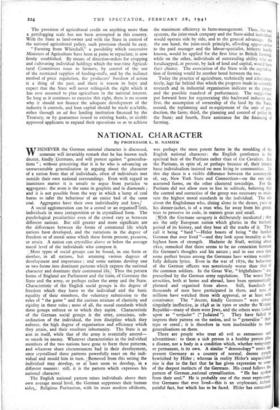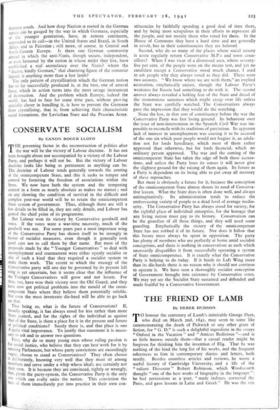NATIONAL CHARACTER
By PROFESSOR L. B. NAMIER
WHENEVER the German national character is discussed, someone will invariably remark that he has known such decent, kindly_Germans, and will protest against " generalisa- tions " ; without perceiving that it is he who is advancing an unwarrantable generalisation in arguing about the character of a nation from that of individuals, often of individuals met outside their own national surroundings. Even with regard to inanimate matter it is unsafe to argue from particles to aggregates : the atom is the same in graphite and in diamonds ; and it is not possible from the way in which a lump of coal burns to infer the behaviour of an entire bed of the same coal. Aggregates have their own individuality and laws.
A social agglomeration can be a crowd or an organise unit, individuals in mass juxtaposition or in crystallised form. The psychological peculiarities even of the crowd vary as between different nations. But still greater and more significant are the differences between the forms of communal life which nations have developed, and the variations in the degree of freedom or of moral sense which these forms present, preserve, or attain. A nation can crystallise above or below the average moral level of the individuals who compose it.
! Most types of social groups can be found, in one form or another, in all nations, but attaining various degrees of development and importance ; and some nations develop one or two forms into dominant patterns which express the national character and dominate their communal life.1 Thus the pattern forms of England are Parliament and the team, of Germany the State and the army, or perhaps rather the army and the State. Characteristic of the English social groups is the degree of freedom which they leave to the individual and the basic equality of their members, the voluntary submission to the rules of " the game " and the curious mixture of elasticity and rigidity in these rules ; most of all, the moral standards which these groups enforce or to which they aspire. Characteristic of the German social groups is the utter, conscious, sub- ordination of the individual, the iron discipline which they enforce, the high degree of organisation and efficiency which they attain, and their resultant inhumanity. The State is an aim in itself, while that of the army is essentially amoral— to smash its enemy. Whatever characteristics in the individual members of the two nations have gone to form these patterns, and whatever share circumstances had in their development, once crystallised these patterns powerfully react on the indi- vidual and mould him in turn. /Removed from this setting the individual may develop, or at least seem to develop, in a different manner: still, it is the pattern which expresses his national character.
The English national pattern raises individuals above their own average moral level, the German suppresses their human sides..., Religious Puritanism, with its more modern offshoots, was perhaps the most potent factor in the moulding of the English national character: the English gentleman is the spiritual heir of the Puritans rather than of the Cavaliers. But the Puritans, in spite of, or perhaps because of, their intense basic individualism insisted on men living in communities. To this day there is a visible difference between the countryside of, say, New York State and Connecticut—on the one side scattered farms, on the other clustered townships. For the Puritans did not allow men to live in solitude, believing that the control and corrective of the group was necessary to main- tain the highest moral standards in the individual. The tale about the Englishman who, dining alone in the desert, puts on his dinner-jacket, is of a man who, far away from his group, tries to preserve its code, in matters great and small.
L_With the Germans savagery is deliberately inculcated ; they are the only European nation which glories in the barbaric period of its history, and they bear all the marks of it They call it being " hard "—Hitler boasts of being " the hardest German that ever lived "—and they look upon brutality as the highest form of strength. Madame de Stael, writing about 181o, remarked that there seems to be no connexion between the German's thoughts and his nature ; and in our own time some perfect brutes among the Germans have written wonder- fully delicate lyrics. Even in the war of 187o, the behaviour of the German officers was notoriously worse than that of the common soldiers. In the Great War, " frightfulness " was prescribed by the German army regulations. The worst Nazi atrocities, both at home and abroad, have been systematically planned and organised from above. Still, hundreds of thousands of men have participated in them, and tens of millions have watched them with approval, or at least with connivance. The " decent, kindly Germans " were always singularly ineffective, in 1848 as in 1900 or under the Weimar Republic—many of them were Jews, and the others were looked upon as " veriudet" (" Judaised"). They have failed to impress their pattern on the nation, and to " generalise " their type or creed ; it is therefore in turn inadmissible to base generalisations on them. There are people who treat all evil as extraneous and adventitious : to them a sick person is a healthy person Plus a disease, not a body in a condition which, whether temporary or permanent, is its own. A similar " demonology" treats the present Germany as a country of normal, decent people bewitched by Hitler ; whereas in reality Hitler's unparalleled rise is due to the fact that he has given expression to some of the deepest instincts of the Germans. His creed follows the pattern of German _national crystallisation. " He has spoken from their soul." He is probably one of the most representk rive Germans that ever lived—this is an unpleasant, indeed, painful fact, but which has to be faced. Hitler has conquered German youth. And how deep Nazism is rooted in the German nature can be gauged by the way in which Germans, especially of the younger generation, have, in remote continents, responded to its call—in the United States and Brazil, in South Africa and in Palestine ; still more, of course, in Central and South-Eastern Europe. Is there one German community abroad in which the anti-Nazis, though secure, independent, or even favoured by the nation in whose midst they live, have established a real ascendancy over the Nazis? where the "decent, kindly German," that charming figure of the romantic legend, is anything more than a lost lamb? The only pattern of crystallisation which the German nation has so far successfully produced is, at the best, one of amoral force, which in action turns into the most savage instrument of destruction. And the problem which Europe, indeed the world, has had to face for some time past, without proving specially clever in handling it, is how to prevent the Germans from crystallising, that is, from achieving their characteristic social formations, the Leviathan State and the Prussian Army.



























 Previous page
Previous page